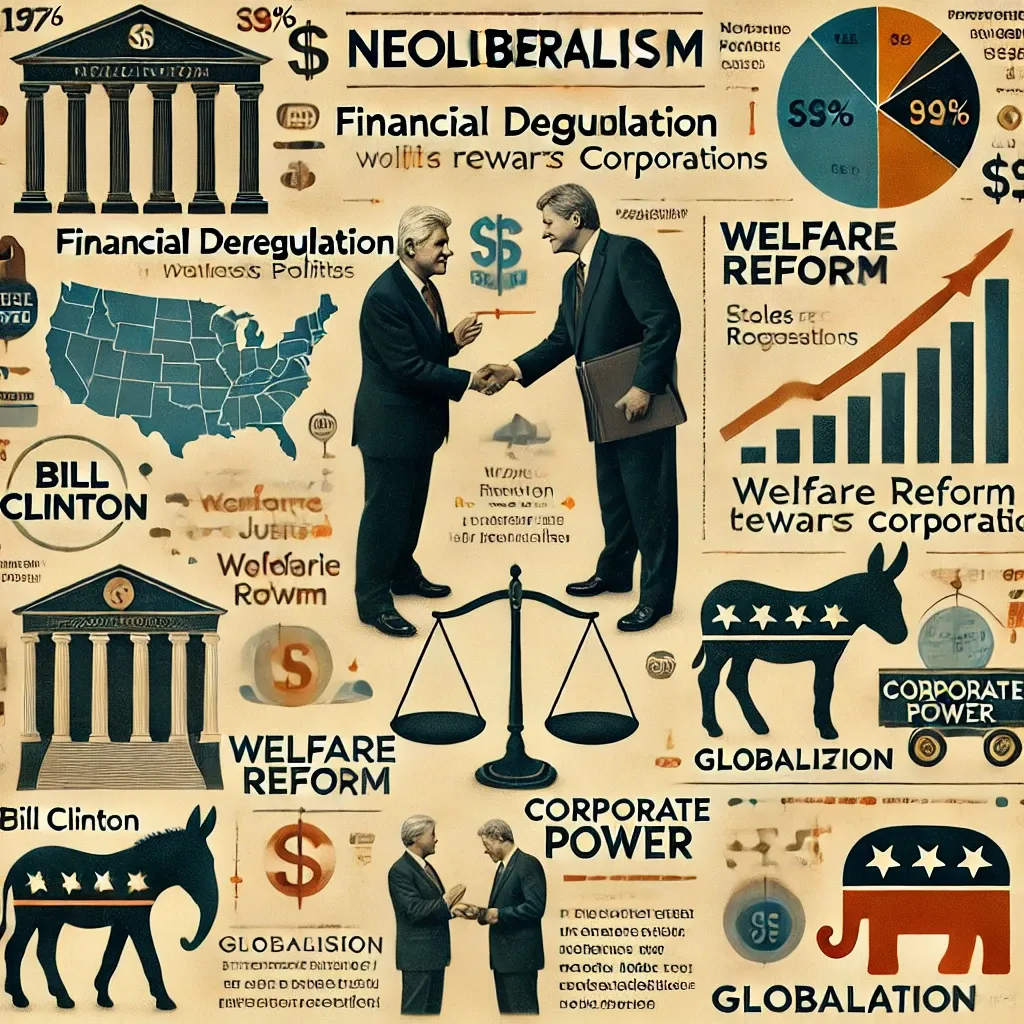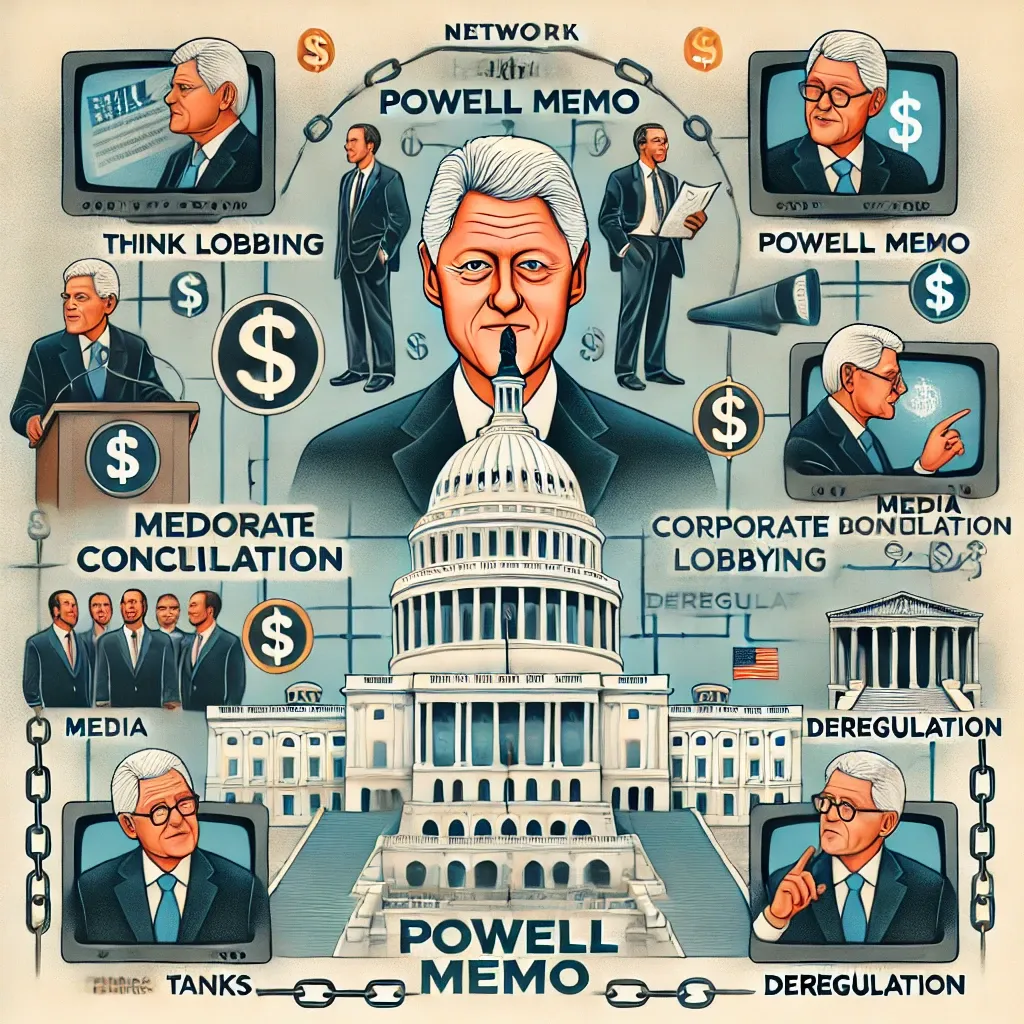Clinton’s Neoliberal Agenda
Bill Clinton's pivotal role in advancing neoliberalism, highlighting his policies favoring corporate interests, ties to Powell Memo-inspired networks, and their impact on shifting U.S. politics

Bill Clinton’s presidency played a pivotal role in advancing neoliberalism, which shifted the Democratic Party toward corporate-friendly policies. This alignment not only solidified neoliberal principles within American politics but also contributed to a political environment where the GOP embraced increasingly extreme positions.
Bill Clinton's embrace of neoliberalism shifted the political center, driving the right so far to the extremes that critical thinking within their ranks has largely eroded.
Clinton’s Neoliberal Agenda
Clinton’s administration embraced core neoliberal policies, characterized by deregulation, privatization, and globalization, often blurring distinctions between the Democratic and Republican approaches to economic governance:
- Welfare Reform: The Personal Responsibility and Work Opportunity Reconciliation Act (1996) reduced federal welfare programs, reflecting a belief in market solutions over state welfare.
- Deregulation: His administration’s repeal of the Glass-Steagall Act (1999) under the Financial Services Modernization Act removed barriers between commercial and investment banking. This decision, driven by Clinton’s Treasury Secretary Robert Rubin (a former Goldman Sachs executive), facilitated the growth of financial institutions that later contributed to the 2008 financial crisis.
- Trade Agreements: Clinton championed the North American Free Trade Agreement (NAFTA), advancing globalization but causing significant industrial job losses in the U.S. Manufacturing communities were severely affected, further weakening labor’s influence.
Corporate Relationships and Neoliberal Advocacy
Clinton maintained strong ties with corporate leaders and neoliberal economists. Prominent figures like Rubin and Larry Summers shaped policies that prioritized Wall Street’s interests:
- His administration expanded the role of corporate lobbying, integrating business leaders into policymaking processes.
- Major donors from the corporate world supported his campaigns, influencing policy outcomes that often favored large industries over individual citizens.
Erosion of the Social Safety Net
Clinton’s policies often placed corporate efficiency and market logic above protections for workers and marginalized groups:
- His welfare reforms placed stringent conditions on assistance, eroding the social safety net for the most vulnerable.
- Labor unions, traditionally aligned with the Democratic Party, saw diminished influence as Clinton pursued free trade agreements and policies that catered to corporate interests.
Impact on the GOP and Political Dynamics
Clinton’s centrist, corporate-friendly policies created a vacuum on the left, pushing the Democratic Party closer to Republican ideologies. This shift:
- Validated neoliberal principles as bipartisan, emboldening Republicans to adopt even more extreme pro-business stances.
- Encouraged the GOP to embrace culture wars and far-right populism to differentiate themselves, moving away from traditional economic conservatism.
Legacy
Clinton’s presidency solidified neoliberalism as a dominant political force in the U.S. His alignment with corporate interests and prioritization of market-based solutions over individual rights played a significant role in shaping modern American politics, making him a critical figure in pushing "normal" politics to the right. This laid the groundwork for the GOP’s radicalization and contributed to the current political and economic landscape, where corporate power often overshadows individual rights and interests
Bill Clinton’s presidency not only embraced neoliberalism but also directly advanced the objectives outlined in Lewis Powell's 1971 memorandum. The Powell Memo served as a blueprint for mobilizing corporate power, advocating for a pro-business legal and economic framework, and solidifying the influence of corporate interests in governance. Clinton’s policies and relationships with individuals and institutions shaped by this memo demonstrate his role in entrenching neoliberalism and furthering the economic and political dominance of corporations.

The Powell Memo’s Influence on Clinton’s Neoliberal Agenda
The Powell Memo, addressed to the U.S. Chamber of Commerce, called for organized corporate efforts to influence public policy, academia, media, and law to counteract perceived anti-business sentiment. By the time Clinton entered office, the memo’s goals had largely materialized through the establishment of think tanks (like the Heritage Foundation and American Enterprise Institute), lobbying groups, and the corporate capture of regulatory bodies. Clinton's administration aligned with these developments:
- Think Tanks and Policy Guidance: Many Clinton-era policies reflected input from neoliberal think tanks that had roots in the Powell Memo's vision. These institutions advocated deregulation, privatization, and tax policies favoring corporations, all of which Clinton championed.
- Corporate Lobbying: Clinton’s administration welcomed corporate lobbyists, many of whom directly benefited from the organizational structures outlined by Powell. His embrace of NAFTA, welfare reform, and financial deregulation was strongly supported by the business community, aligning with Powell’s call for corporate leaders to dominate policy debates.
Clinton’s Key Relationships with Powell-Aligned Figures
Clinton surrounded himself with individuals deeply influenced by the Powell Memo’s philosophy:
- Robert Rubin and Larry Summers: Both were architects of Clinton’s economic policies and staunch proponents of deregulation. Rubin, a former Goldman Sachs executive, exemplified the corporate-government revolving door that Powell envisioned.
- Alan Greenspan: As Federal Reserve Chair, Greenspan’s neoliberal monetary policies aligned with the pro-business environment fostered by Clinton’s administration. Greenspan was a direct beneficiary of the Powell-inspired network that elevated market-friendly policymakers.
- Corporate Executives and Donors: Clinton maintained strong ties with figures from industries such as banking, telecommunications, and technology. These relationships underscored the increasing corporate influence over the Democratic Party, consistent with the Powell Memo's goal of embedding business priorities within both political parties.
Policies Advancing Powell’s Vision
Clinton’s legislative and regulatory actions consistently erred on the side of corporate interests, advancing the goals outlined in the Powell Memo:
- Financial Deregulation: The repeal of Glass-Steagall Act (1999) epitomized Clinton’s alignment with Powell’s call for dismantling regulatory barriers to corporate expansion. This allowed financial institutions to consolidate power, increasing their influence in politics and the economy.
- Trade Agreements: NAFTA’s implementation was a major victory for corporate interests, enabling globalization that primarily benefited multinational companies while undermining domestic labor protections. This move was consistent with Powell’s emphasis on prioritizing corporate growth over workers’ rights.
- Telecommunications Act of 1996: This act deregulated the telecommunications industry, leading to significant media consolidation. It directly benefited large corporations and aligned with Powell’s advocacy for greater corporate control over public discourse.
- Welfare Reform: Clinton’s welfare reforms reduced federal assistance and pushed individuals into low-wage jobs, reinforcing the corporate demand for a cheap labor force.
The Powell Memo’s Legacy in Clinton’s Era
By aligning with Powell Memo-inspired frameworks, Clinton institutionalized the idea that corporate interests were synonymous with national interests:
- Weakening Labor Movements: Clinton’s trade policies and deregulation eroded union power, aligning with Powell’s critique of labor as an impediment to business.
- Corporate Capture of Governance: Clinton’s presidency accelerated the integration of corporate leaders into public policy, ensuring the dominance of Powell Memo-aligned strategies in decision-making.
The GOP’s Radicalization and Clinton’s Role
Clinton’s adoption of neoliberalism as the Democratic Party’s framework not only advanced Powell’s agenda but also created political space for the GOP to move further right:
- Bipartisan Neoliberalism: By making pro-business policies bipartisan, Clinton normalized the Powell-inspired economic agenda. This validation encouraged Republicans to push more radical versions of neoliberalism, such as extreme tax cuts and deregulation under George W. Bush and Donald Trump.
- Cultural and Social Differentiation: With Clinton co-opting economic conservatism, the GOP turned increasingly toward cultural and identity-based politics to distinguish itself, leading to the rise of far-right populism.
Clinton’s Legacy in Neoliberalism and Powell’s Vision
Bill Clinton’s presidency stands as a critical chapter in the Powell Memo’s influence on American politics. His administration solidified corporate dominance, weakened labor, and advanced neoliberal principles that prioritized market solutions over individual rights. By blurring the lines between Democratic and Republican economic policies, Clinton entrenched Powell’s vision of corporate power, pushing the political spectrum so far to the right that the GOP’s eventual radicalization was not only inevitable but actively facilitated.
